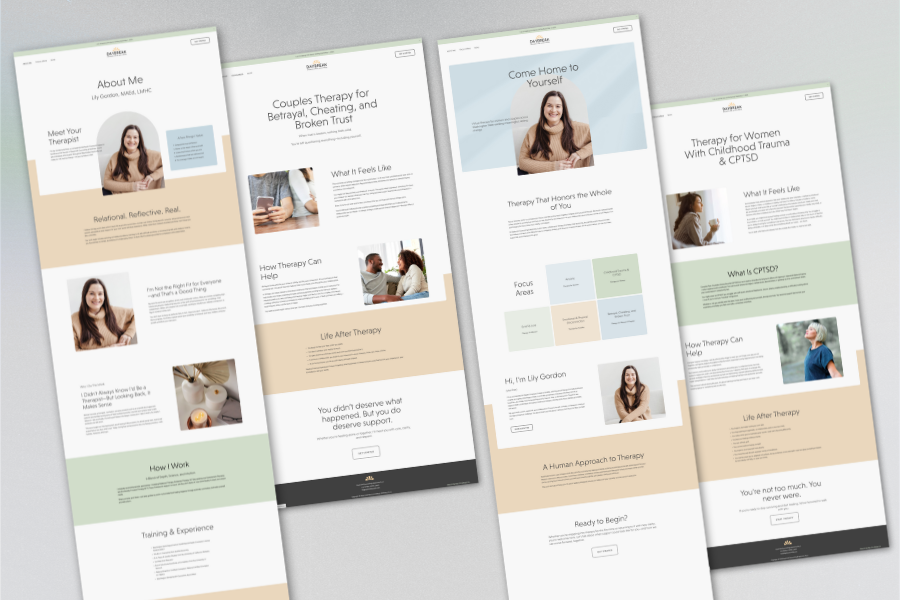Therapists, Stop Rambling on Your Website
6 Mistakes That Turn Your Website Copy Into a Long-Winded Mess
If there is one thing that's stopping you from turning website visitors into actual paying clients, it's your website copy. In this article, I'm going to help you understand the common writing habits that lead to long, rambling copy.
Here are 6 common mistakes that turn copy into a rambling mess:
1. You're being vague
Writing a bunch of generic text doesn't entice the reader - it bores the reader. When I read vague copy, a little voice in my head goes, "huh?" and the moment the boredom strikes, I'm outta there.
Example: "I help people improve their lives." You might think this sounds fine, but your website visitor will have a lot of questions, like "Yeah, but does she understand MY problem?" and "How will my life be improved exactly?"
Instead of writing blah blah blah, be specific about what your clients can get from you: "I help stressed-out women learn how to take things off their plate so they can reduce stress and enjoy life again."
2. Too much information
When I release a new website to its owner, one of my biggest pet peeves is when they cram every square inch of each page with text. They've thrown buckets of extra ingredients into my beautiful, simple chocolate cake recipe, and now the chocolate cake looks and tastes like garbage.
Give your website visitors the information they need to understand how they can benefit from your services. Don't overwhelm them with so much information that it's painful to read. Each page should focus on a single message or single action you want them to take. Everything else is extraneous and will bomb your conversion rates. (Conversion is web-speak for converting website visitors to paying clients).
3. You're focusing on yourself
This website copy mistake is a big one for therapists and coaches. They have a terrible habit of making the copy all about themselves. It sounds something like this, "I'm a licensed mental health counselor with 20 years of experience serving families in the Greater Seattle area."
Sure, 20 years of experience is a good thing, but it's not what clients care about. They don't care about your services at all. They want to know how you can help them solve their problems and improve their lives. Instead of using your website to talk about you, focus on the benefits your clients will experience if they work with you.
5. You're writing a novel
You may be an excellent writer, but writing for the web is different from writing a novel. That is because your website visitors aren't reviewing your website with the same focus and concentration they would bring to reading a book or even a blog post. Why? Because they aren't there to be entertained. They are on your website hoping to quickly find out if your service can give them the solution to their problem.
When people read website copy, they don't start from the top of a page and work their way to the bottom. They also don't always land on your home page and read the other pages in order. Instead, they scan pages for critical information to decide if they should stick around. The information on each page should be able to stand alone. You should get your main message across even if the visitor doesn't hit every page (most don't, btw).
6. Unnecessary Words
The English language is filled with redundant and empty words. Have you listened to President Trump's constant use of the word "very" in his speeches? Every time he uses "very" or "very very," he attempts (unsuccessfully) to add horsepower to what is holding his attention but says nothing. The words take up space where more substantial synonyms could be used. For every "very strong on Israel," an opportunity is lost to tell us precisely what is strong.
There are 13 unnecessary words or phrases in the following paragraph. Can you find them?
Emotional and psychological trauma is the result of rather stressful events that just shatter your sense of security, actually making you feel helpless in a very dangerous world. Psychological trauma can leave you virtually struggling with upsetting emotions, memories, and anxiety that generally won't go away. Undoubtedly, it can leave you feeling really numb, suddenly disconnected, and perhaps unable to trust other people. At the end of the day, it is important that you learn how to truly manage these emotions.
Here are a few hints:
There is no difference between something that is stressful and something that is rather stressful.
There is no difference between a dangerous world and a very dangerous world.
Here are other examples of unnecessary words: actually, particular, virtually, obviously, rather, generally, certainly, practically, suddenly, specific, really, truly, various, clearly, just, basically, undoubtedly, then.
Here are examples of empty phrases: It is important that, due to the fact that, absolutely necessary, assemble together, at all times, kind of/sort of, an additional, added bonus, for a period of x time, type of, lot of, for this reason, as far as I'm concerned, as necessary, as a matter of fact.
These empty words and phrases are just a sampling. Redundancy and repetition are built into our language for good reasons. The trick is to know when to use a tight, spare sentence and allow some redundancy. Try to give every word a purpose. If it doesn't, nix it. You will gain space to write more compelling website content.
4. You are writing to everyone
You've heard it before, and I'm going to repeat it: You need a niche. Without a niche, your website copy targets NO ONE. Or worse, it opens the door to people you don't like to work with (or aren't suited to work with). Writing for a broad audience results in copy that doesn't resonate with anyone.
Identify your ideal client and write for them. For example, if you are a coach and focus on career coaching for women returning to the workforce after having children, write your copy for female parents in their 40s and 50s. Don't write generic prose that will appeal to men or people struggling with other career issues.
Summing Up
Keep it simple. When a potential client lands on your website, you have mere seconds to capture their attention. Your goal is to inform your audience, not to impress them. Avoid jargon and throw-away terminology that could encourage visitors to click away. Get your message across as precisely and persuasively as possible. Exclude anything that hinders your goal.
Writing web copy can be stressful (how do you cram so many ideas into so few words?). Still, it can be an artful and rewarding undertaking. Start by consolidating ideas and concepts, finesse a few punchy headlines, and craft a simple paragraph. Then move on to the next section. Before you know it, you'll have a website filled with beautiful, actionable copy.






























